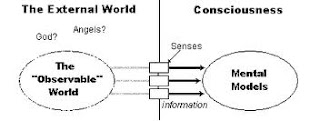Saturday, May 19, 2012
Structuralism And Immanuel Kant's Philosophy
"Whatever we call reality, it is revealed to us only through the active
construction in which we participate." (Ilya Prigogine, Order Out Of Chaos)
Structuralism emerges from the elementaristic side of the holism/elementarism
debate as an extension of the neo-Kantian position. Form, within this tradition,
takes precedence over content, but in so far as structure itself is a holistic
concept, the actual locus of structuralism in relation to the holism/
elementarism debate is somewhat ambiguous. I believe that within this ambiguity
will be found a resolution to the holism/elementarism debate. In order to bring
this debate to a close, however, we must first look at the various
structural models that have been described in linguistics (Saussure and
Chomsky,) anthropology (Levi-Strauss,) psychology (Piaget,) and philosophy
(Foucault.) My description of these various forms of structuralism will
concentrate in the areas that have a direct bearing on bringing this debate to a
satisfactory conclusion. With that end in mind, I would like to begin by taking
a peak at the philosophy of Immanuel Kant.
Kant, in his attempt to synthesize the rationalist thought of Descartes and
Leibnitz with the empirical thought of Locke, Berkeley, and Hume, understood
sense experience to be manipulated within the inherent structure of mental
categories. In his analysis of this structure he concluded that there is more
than one kind of knowing (Critique of Pure Reason, 1781, Practical Reason,
1788, and Judgment, 1790) but the major importance of Kant's analysis is found
in his understanding of the logical consistency and necessity of both sensed
space and time and mathematical space and time. This aspect of Kant's
philosophy, although it represented a major success for Kant, in retrospect, is
not so well received.
Just as Locke was driven to his theory of ideas by the consequences of Newton's
deterministic universe, Kant had to face a similar determinism. It was not with
atoms and forces which his determinism had to contend, rather, it was with the
determined nature of knowledge itself. Kant's transcendental ego, when pursued
to its logical conclusion, did not allow for individual freedom. He accounted
for man as knower of the universe, but he did not account for man as a free
moral agent within the universe. Kant used the presuppositional method to solve
this problem: "It is impossible to conceive anything at all in the world, or
even out of it, which can be taken as good without qualification, except a good
will." [Immanual Kant, The Moral Law, 1948, p.59]
In other words, he presupposes free will to allow for moral action i.e. Kant's
practical ego. This is a key concept because upon reading Kant the German
champion of freedom, Fichte, was able to show that it was not the categories of
understanding which allowed a person to know the universe, it was the person's
own individual will that will's knowledge of the universe through the
categories.
Subscribe to:
Post Comments (Atom)





No comments:
Post a Comment